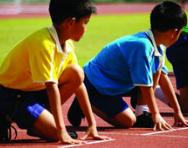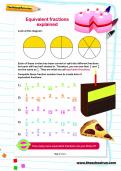Key Stage 2 PE – what your child learns

In Key Stage 2 physical and health education, gross and fine motor skills are further developed through a variety of team sports, games and activities.
Effective team play highlights the sharing of responsibilities and goals amongst players and encourages meaningful group interaction.


Boost your child's maths & English skills!
- Follow a weekly programme
- Maths & English resources
- Keeps your child's learning on track
The aim is to provide opportunities for pupils to experience and learn the benefits of teamwork, cooperation and fair play needed to achieve a common goal.
Lesson examples
Over the next few years, here are some of the kinds of activities your child might get involved in at school:
- Year 3 pupils compose a dance inspired by the building of the pyramids. They work in pairs to first listen to some music and then to explore shapes, actions and patterns.
- Year 4 pupils use floor and apparatus to demonstrate ways of travelling. They show skill and agility in ways of turning or rotating in their sequence and in having a clear starting and finishing position.
- Using hockey sticks, a year 5 class concentrates on keeping tennis balls close to the stick while moving around the area. Some of the pupils progress to hitting the ball to other players, using the flat side of the stick only.
- Some year 6 pupils working beyond the expectation for their year may show consistent precision, control and fluency in their hockey strokes. They demonstrate speed and pace, adapting techniques accurately and appropriately to the demands of the activity.
In dance activities, children reflect on how to use movement to explore and communicate ideas and feelings. They learn to develop motor skills that will enable them to respond in a variety of ways. They will be encouraged through active participation, reflective observation and critical evaluation to develop these skills.
Help your child at home
- Walk to and from school and whenever else you can.
- Provide opportunities for active play with your child’s friends outside of school.
- Encourage them to take up of a sport or structured exercise hobby.
- Encourage them to undertake moderately intensive activity for at least one hour every day (for example, four 15-minute periods) such as brisk walking, dance, games, swimming, cycling, active play or sport.
- Help your child to choose activities that enhance and maintain muscular strength, flexibility and bone health at least twice a week, such as climbing, skipping, jumping or gymnastics.
- Talk to your child about the importance of staying healthy and active, and about the dangers of smoking, drinking and stress.
- Encourage a healthy diet daily of five fruit and vegetables in a variety of types and colours.
- Join the British Heart Foundation's Artie Beat Club. Your child will get a quarterly newsletter, badge, Artie Beat 5-a-day chart, and opportunities to enter competitions and win prizes.

Give your child a headstart
- FREE articles & expert information
- FREE resources & activities
- FREE homework help